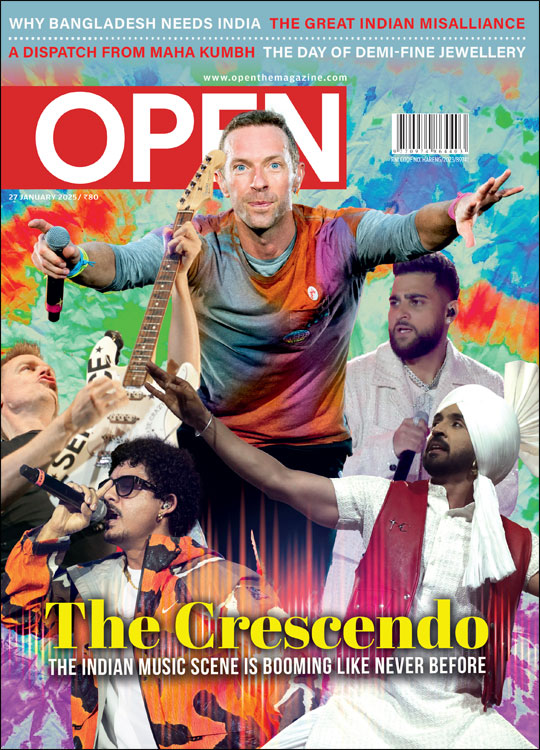Self-Portraits by Carlyle
Bafta-winning actor Robert Carlyle talks about living in the skin of his characters, going homeless on the streets of London, turning director, and his new movie, California Solo
 Nikhil Taneja
Nikhil Taneja
 Nikhil Taneja
|
22 Nov, 2012
Nikhil Taneja
|
22 Nov, 2012
/wp-content/uploads/2015/11/cin-carlyle.jpg)
Bafta-winning actor Robert Carlyle talks about living in the skin of his characters, going homeless on the streets of London, turning director, and his new movie, California Solo
It is not easy, or even appropriate, to put actor Robert Carlyle in a box. He is a method actor who once lived homeless on the streets of London to prepare for a role, and whose penchant for anti-hero roles has resulted in some of the most stunning contemporary performances in British cinema, not least that of the psychopathic Begbie in the cult film Trainspotting. His portrayals of the regular Joe have given the British underclass a much-needed voice and the rest of us cinematic gems like the Oscar-nominated The Full Monty. This Bond villain from The World Is Not Enough is a Bafta winner, an Emmy nominee and possibly Scotland’s most respected export after Sean Connery. An actor who is known to let his work speak for himself and rarely ever interacts with the media lets his guard down in this conversation:
Q You play a faded rockstar in California Solo. I believe you were in a rock band yourself, early in your life. Do you ever look back and imagine what life would have been like, had you become a rockstar?
A You know, to be honest with you, I do look back on those days, as we all do, thinking ‘what if’, but never think of life as a rockstar because (laughs) I wasn’t really any good. I do enjoy music, and while I have a few close actor friends, most of my friends are from the music industry. Some of them, like the Gallagher brothers [of Oasis fame], are very well known and famous, so I kind of live life vicariously through them sometimes (laughs).
I go to a lot of gigs and concerts and I always watch from the side of the stage to get close to the feeling of what it may be like to stand there in the fog, in front of 20-40,000 people. But as I said, I played music for a very brief time in my life, for just a year-and-a-half, when I was 17 or something. And I thank God that it was in those days before iPhones and cameras, because then there would be evidence of my singing somewhere (laughs). I did it just to enjoy the anarchic quality of it all, to be honest. I didn’t have too much skill, but I was a bit of a rebel and music was a way to have my voice heard and live like a rockstar, you know? But eventually, I realised I can really go all out as an actor too, and I didn’t need music anymore to try and make people notice that I had something to say.
Q On California Solo, you worked with a relatively new director, Marshall Lewy. How do you judge a director, especially one who is not very experienced? Isn’t it a gamble?
A I think that’s true, it is quite a gamble. I saw some of Marshall’s earlier work, but even after that, you can’t really tell how the film is going to turn out. But as an actor, you have to be prepared to take that sort of risk, because otherwise you become too safe. Everything becomes the same then, and you just go through film after film and character after character as an echo of the previous part you played. So you take these chances. For instance, when I first worked with Danny Boyle on Trainspotting, that was a gamble (chuckles), and that turned out spectacularly. And then there are times when it all falls flat. But you know, there’s a saying in the UK that I abide by: ‘If you don’t buy a ticket, you don’t win the lottery.’
Also, the fact that the film is low budget always appeals to me, because I think then you have a chance of creating something meaningful, as opposed to big budget films, which are exciting but don’t really talk to the viewer. So that is what attracted me to California Solo too. As for Marshall specifically, he wrote the script with me in mind for the part of the former Britpop rocker. When I got the script, I noticed that there were certain ways in which the character of Lachlan [the protagonist] reacts that are similar to how I would react, or at least people who I know in real life who are like the character would react. Also, Lachlan is an everyman who has ended up on the wrong side of the tracks in life like loads of people who have had chances that passed them by. He is not necessarily a bad guy, he’s just got a bit of a bad break, and that’s something I found very interesting.
Q And how do you judge a script?
A I think, first of all, the character has to speak to you in some way. And then, if this character is behaving and reacting in the way that he should, and if he’s not going off on a tangent, not doing anything only for effect or only to please the audience, then I start thinking about it seriously. Even after this step, it’s quite an intense process for me actually. I go up and down a script for two days and two nights or so, and try and find any weaknesses in there. If it seems good, then you think there’s a chance that this is going to work.
But ultimately, for me, particularly in the low-budget world, it’s always been about a script that is trying to show people a mirror to themselves or their own souls. If I take the example of The Full Monty, Peter [Cattaneo] had not directed anything before. But there was something about Simon Beaufoy’s script that just spoke to me and I thought, therefore, it would speak to the rest of the public too. So I think it’s about having something essential, something a little more than fluff. A good script is beyond just shadows and light, you know, it’s about the human persona and about characters who reach [out to] society, and touch the lives of people who are watching.
Q You come from the school of method acting and go to great lengths to prepare for a role.
A Yeah, I believe so, but a lot has changed over the years. In the early days, when I got the part, I would try and live it quite literally. I would take it home with me and be the part for the time of the shoot. The best example of that would be when I did a movie called Safe, where I was playing a homeless person. I’ve never been homeless and never lived on the streets, so to get into the character, I went and lived on the streets of London for about a week, with absolutely no money on me. It was a hell of an experience and I can still remember every day and every night of it even now. And it really did help me as an actor, so for quite some time, I would use similar techniques, like going to the place that the character came from, living like him, trying to understand his job, his relationships, and so on. If the character had an accent, I would speak in that accent for the entire time of the shoot.
But then a very strange thing happened. (Chuckles) Fame sort of knocked at my door and it became impossible for me to do such things. I couldn’t go to the bar and be Danny the labourer. So that entirely changed my approach to acting. The approach then became more cerebral in a way, and more self exploratory. Rather than living like the character externally, I then started to live him internally. I would get inside the guy’s head and try and tap into his emotions, his feelings, his pain, and try and see the world through his eyes for the period of the shoot. I would try and tap into him and react the way he does. In California Solo, for example, Lachlan is a guy who is best described as ‘comfortably numb’—he has gone from the guy who would be performing in front of 20,000 people to a guy who now has absolutely nothing going on in life. His life has had such a deadening effect on him that he has now become comfortable in his numbness. So I tapped into that emotion throughout the shoot.
Q What about the process of playing Rumpelstiltskin in the TV series Once Upon A Time? You seem to be absolutely relishing it.
A I do, actually, even though it is one of the most intense roles of my life. The character of Rumpelstiltskin is so well-written, dynamic and otherworldly that I’m so glad to have got the chance of doing it my way.
There’s the fact that this guy is 300 years old and he has met so many people in his life that he’s lost to who he really is now, so I didn’t want to give him a normal persona. So he disguises who he really is by taking on different characteristics of people he’s known, every time. But there was something missing, and I found that in my six-year-old son, Pearce, who I once heard making this incoherent sing-song voice (sings it out). And that was it! I injected this childlike quality to Rumpelstiltskin and it became the X-factor it needed.
Q You seem to enjoy playing the anti-hero. What fascinates you about such characters?
A I think, as my career progressed from the late 1980s and early 1990s, I realised that the parts I gravitated towards were those of the anti-hero. And that’s because I have always liked giving a voice to people who didn’t really have any, whether it is the character of a lower-class construction worker like Stevie in Riff-Raff, or whether it’s Gaz, the unemployed steel worker from The Full Monty. And by giving them a voice, I was able to show the audience that everyone’s got a story and no one and nothing is in shades of black and white; everyone’s got shades of grey.
I did, eventually, go through a time when I kind of struggled with this decision and didn’t know if it was the right thing to do. But then I came upon this idea in my mind that an actor is like an artist who paints on canvases. So, in a sense, these characters would be like a series of self portraits, because artists, as they paint themselves through the years, reflect changes in society through these portraits. I realised that I would be doing the same, so I shouldn’t be afraid of this or run away from it, and I should instead embrace this, because there was nothing pompous or highbrow in trying to give people a voice.
Q Have you considered taking up direction? Speaking with you gives me the sense that growing up, you would have been the kind of cinema geek who was far more interested in directing than acting.
A Yeah, I loved cinema while growing up and for the longest time, wanted to be a director. My father loved the movies too and would take me to a cinema three-four times a week, as long as there were cowboys in the movies (laughs). He loved Westerns, and so do I. I directed a few things as projects in drama school and I didn’t think I was confused about being an actor or director. And then, I met a wonderful man called Ken Loach, who put me in front of a camera in Riff-Raff, and that changed everything for me, everything. I realised I enjoyed it a lot.
And you know, it’s funny you asked because I am currently trying to adapt a book called The Long Midnight of Barney Thomson for a movie that I hope to direct next year—and I say ‘hope’ with my fingers crossed. It’s a quirky, interesting dark comedy about a barber who (laughs) accidentally kills two or three people but didn’t really mean to. The reason I took so long to think about direction is that I respect the business too much, if you know what I mean. Direction is a very, very tough job and takes an awful lot of your time and braincells, so if you don’t find something that talks to you, it’s never a good idea to get into it. I was offered several movies, but I didn’t want to do anything half-heartedly or something I didn’t love. And I love this script.
Q You have had a wonderful working relationship with Danny Boyle, having made fantastic movies like Trainspotting, The Beach and 28 Weeks Later with him. Anything you learnt from his style of direction that can come handy?
A I love Danny. I love him professionally and as a person, and you know people don’t think that I am an emotional guy because I play such psycho characters (chuckles), but I actually couldn’t stop crying after seeing Slumdog Millionaire. Danny’s directed the film so beautifully. And he’s not only a brilliant director, he’s exactly the kind of guy you would speak to for advice when you are doing your own film. Ken Loach and he are the guys I’ve learnt most from, and although I hate to use the word, they are most like ‘mentors’ to me. Danny will do anything to make you comfortable.
I remember, during Trainspotting, there was a funny scene that we had to cut quite a few times because there was a lot of noise in the background, and that came from Danny laughing. He couldn’t stop because he really was into it, you know? When he talks, he would always say, “We are going to do this film this way” instead of “I am going to do the film this way”. The overwhelming thing I have taken from Danny is the realisation that you can’t do it alone, that it’s always about the ensemble and that you can only be brilliant when everyone else is. The art of collaboration with actors and the crew, in as encouraging a manner as possible, is something I hope to use too.

/wp-content/uploads/2025/01/Cover-Indian-Music.jpg)










More Columns
Israel-Hamas Ceasefire: Five things to watch out for in the days to come Rahul Pandita
Trump’s First Day at Work Siddharth Singh
What Are the Natural Solutions for Acidity and Bloating Dr. Kriti Soni